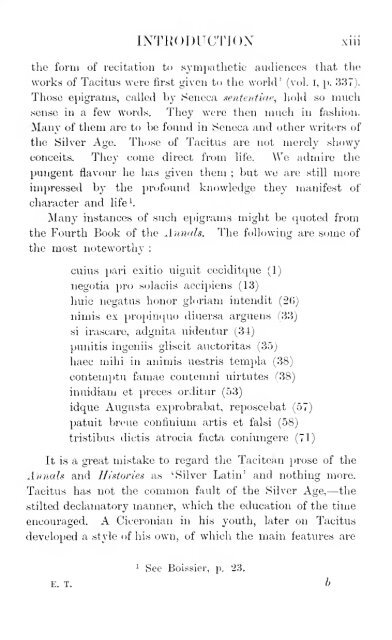Create successful ePaper yourself
Turn your PDF publications into a flip-book with our unique Google optimized e-Paper software.
INTRODUCTION xiii<br />
the form <strong>of</strong> recitation to sympathetic audiences that the<br />
works <strong>of</strong> <strong>Tacitus</strong> were first given to the world' (vol. i, \x 337).<br />
Those epigrams, called by Seneca sententiae, hold so much<br />
sense in a few words. <strong>The</strong>y were then miich in fashion.<br />
Many <strong>of</strong> them are to be found in Seneca and other writers <strong>of</strong><br />
the Silver Age. Those <strong>of</strong> <strong>Tacitus</strong> are not merely showy<br />
conceits. <strong>The</strong>y come direct from life. We admire the<br />
pungent flavour he has given them ; but we are still more<br />
impressed by the pr<strong>of</strong>ound knowledge they manifest <strong>of</strong><br />
character and life^<br />
Many instances <strong>of</strong> such epigrams might be quoted from<br />
the Fourth Book <strong>of</strong> the Annals. <strong>The</strong> following are some <strong>of</strong><br />
the most noteworthy :<br />
cuius pari exitio uiguit ceciditque (1)<br />
negotia pro solaciis accipiens (13)<br />
huic uegatus honor gloriam inteudit (26)<br />
nimis ex propinquo diuersa arguens (33)<br />
si irascare, adgnita uidentur (34)<br />
punitis ingeniis gliscit auctoritas (35)<br />
haec mihi in animis uestris templa (38)<br />
contemptu famae coutemni uirtutes (38)<br />
inuidiam et preces orditur (53)<br />
idque Augusta exprobrabat, reposcebat (57)<br />
patuit breue confinium artis et falsi (58)<br />
tristibus dictis atrocia facta coniungere (71)<br />
It is a great mistake to regard the Tacitean prose <strong>of</strong> the<br />
Annals and Histories as 'Silver Latin' and nothing more.<br />
<strong>Tacitus</strong> has not the common fault <strong>of</strong> the Silver Age,—the<br />
stilted declamatory manner, which the education <strong>of</strong> the time<br />
encouraged. A Ciceronian in his youth, later on <strong>Tacitus</strong><br />
developed a style <strong>of</strong> his own, <strong>of</strong> which the main features are<br />
^ See Boissier, p. 23.

















